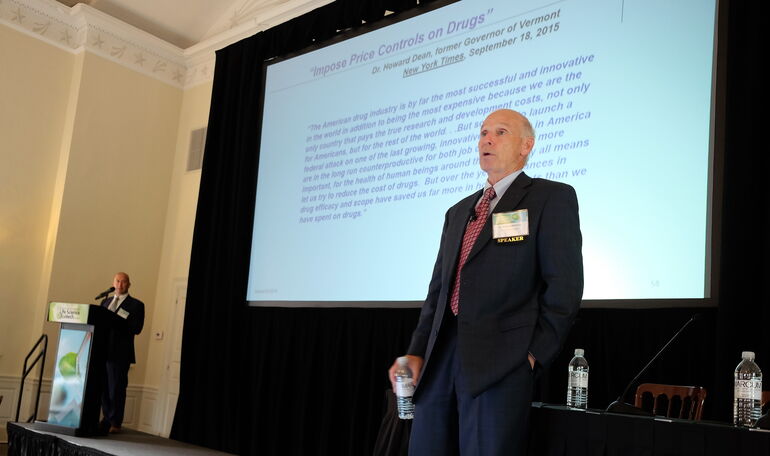Processing Your Payment
Please do not leave this page until complete. This can take a few moments.
- News
-
Editions
View Digital Editions
Biweekly Issues
- May 13, 2024
- April 29, 2024
- April 15, 2024
- April 1, 2024
- March 18, 2024
- March 4, 2024
- February 19, 2024
- February 5, 2024
- January 22, 2024
- + More
Special Editions
- Lists
- Viewpoints
- HBJ Events
- Business Calendar
- Custom Content
Shock therapy: The case for sky-high drug prices
 PHOTO | New Haven BIZ
LaMattina argued that drug pricing ought to be based not on costs, but on value — to patients, the health-care system and society.
PHOTO | New Haven BIZ
LaMattina argued that drug pricing ought to be based not on costs, but on value — to patients, the health-care system and society.
Prescription drug pricing isn’t about corporate greed and shouldn’t be about recouping the high cost of R&D, a reason often cited by the pharmaceutical industry to justify soaring prices in recent years.
It’s about value.
So says John L. LaMattina, a former Pfizer executive and senior partner at Boston biotech PureTech Health. LaMattina gave the keynote speech, “Facts & Myths of Drug Pricing,” Thursday at the 2019 Marcum New England Life Science & Biotech Summit.
Speaking at the New Haven Lawn Club to a room filled with Connecticut bioscience professionals, LaMattina gave the industry perspective on what’s become a hot-button issue on both sides of the political aisle.
In recent months, everyone from President Donald J. Trump to members of Congress and state lawmakers have been calling for new measures to curb the high cost of prescription drugs.
“I would challenge you to find any other [public-policy topic] where Donald Trump can say ‘The drug industry is getting away with murder,’ and Bernie Sanders says, ‘He’s exactly right,’” LaMattina joked.
With a high failure rate and an estimated average price tag of $2.6 billion to bring a new drug to market, there’s truth behind industry assertions that drug development is a high-cost, high-risk venture that should be rewarded commensurately, LaMattina said.
“But I would argue, So what? Lots of endeavors are challenging,” he continued. “What pricing really should be based on is value — the value that the drug brings to the health-care system, patients and society.”
LaMattina said the rise of gene therapy over the last few years has driven much of the debate about drug pricing. Drugmaker Novartis made headlines this summer when it announced its new gene therapy treatment for Spinal Muscular Atrophy would cost a staggering $2.1 million for a single injection.
“Is this gouging or is it reasonable?” he asked. LaMattina argues the latter. The one-time injection effectively cures SMA, a progressive disease that erodes muscular function, which in severe form can lead to death before age two.
“This is a life-saving therapy. You’re taking people who were dying at the age of two, who are now hopefully going to lead a full life,” he said. It also costs considerably less than the existing treatment, he said, which must be taken for life at an annual cost of $750,000 the first year and $375,000 in each subsequent year.
“This [Novartis drug] is actually a pretty good deal. A single dose. Better for patients, better for the health-care system and cheaper than the existing therapy,” he said.
He also pointed to a Hepatitis C treatment which made headlines for its $1,000-a-pill list price. With a cure rate of more than 90 percent, LaMattina said the drug could lower health costs by reducing the need for liver transplants.
But there are exceptions, namely what LaMattina dubbed “the Martin Shkreli problem.” Nicknamed the “Pharma Bro,” Shkreli grabbed headlines in 2015 when his Turing Pharmaceuticals bought the rights to a lifesaving antiparasitic used by pregnant women and AIDS patients, and hiked the price by more than 5,000 percent — from $13.50 to $750 a pill.
“There’s no value added at all. This was just hijacking,” LaMattina said. “This is terrible, unethical behavior.”
He also decried drug companies that sell drugs that combine inexpensive over-the-counter medicines — such as ibuprofen and the acid-reducer famotidine (which sells under the brand name Pepcid) — at marked up prices that top $2,000 for a 90-day supply.
As for the gene therapies and other new treatments he considers legitimately priced based on value, drug companies should impose their own controls, he said.
He advocates five-year payment plans for high-priced drugs, as Novartis did with its SMA therapy, and said annual price increases should be tied to inflation.
Meanwhile, LaMattina rejected critics’ assertion that the pharmaceutical industry is “obscenely profitable.” He said metrics such as return on equity show the drug industry is somewhere “in the middle” when it comes to profitability, behind other sectors such as computer sciences and the beverage industry.
“I don’t see an industry that’s profiteering,” he said. “I see an industry that’s taking its resources and investing in the high-risk business called innovation.”
Contact Natalie Missakian at news@newhavenbiz.com
Correction: The estimated average price tag to bring a new drug to market is $2.6 billion. An earlier version of this story had the incorrect amount.

2022 Giving Guide
This special edition informs and connects businesses with nonprofit organizations that are aligned with what they care about. Each nonprofit profile provides a crisp snapshot of the organization’s mission, goals, area of service, giving and volunteer opportunities and board leadership.
Learn more
Subscribe
Hartford Business Journal provides the top coverage of news, trends, data, politics and personalities of the area’s business community. Get the news and information you need from the award-winning writers at HBJ. Don’t miss out - subscribe today.
Subscribe
2024 Book of Lists
Delivering Vital Marketplace Content and Context to Senior Decision Makers Throughout Greater Hartford and the State ... All Year Long!
Read Here-
2022 Giving Guide
This special edition informs and connects businesses with nonprofit organizations that are aligned with what they care about. Each nonprofit profile provides a crisp snapshot of the organization’s mission, goals, area of service, giving and volunteer opportunities and board leadership.
-
Subscribe
Hartford Business Journal provides the top coverage of news, trends, data, politics and personalities of the area’s business community. Get the news and information you need from the award-winning writers at HBJ. Don’t miss out - subscribe today.
-
2024 Book of Lists
Delivering Vital Marketplace Content and Context to Senior Decision Makers Throughout Greater Hartford and the State ... All Year Long!
ABOUT
ADVERTISE
NEW ENGLAND BUSINESS MEDIA SITES
No articles left
Get access now
In order to use this feature, we need some information from you. You can also login or register for a free account.
By clicking submit you are agreeing to our cookie usage and Privacy Policy
Already have an account? Login
Already have an account? Login
Want to create an account? Register
Get access now
In order to use this feature, we need some information from you. You can also login or register for a free account.
By clicking submit you are agreeing to our cookie usage and Privacy Policy
Already have an account? Login
Already have an account? Login
Want to create an account? Register






0 Comments